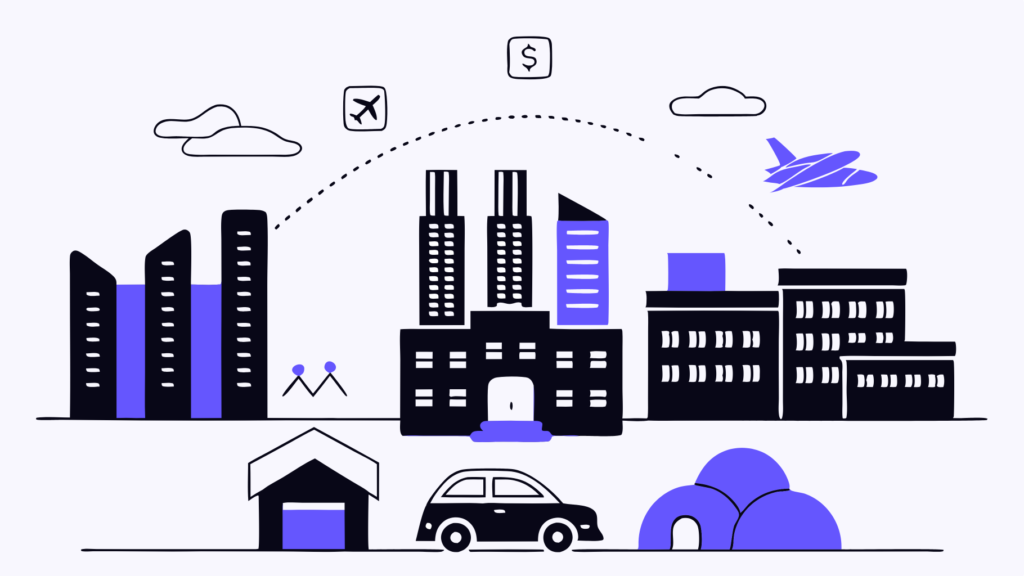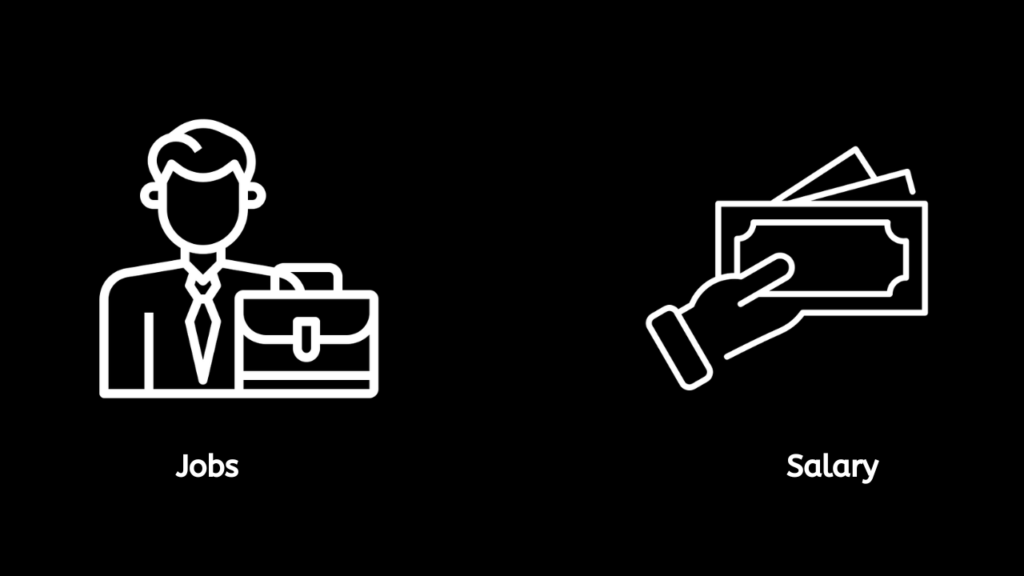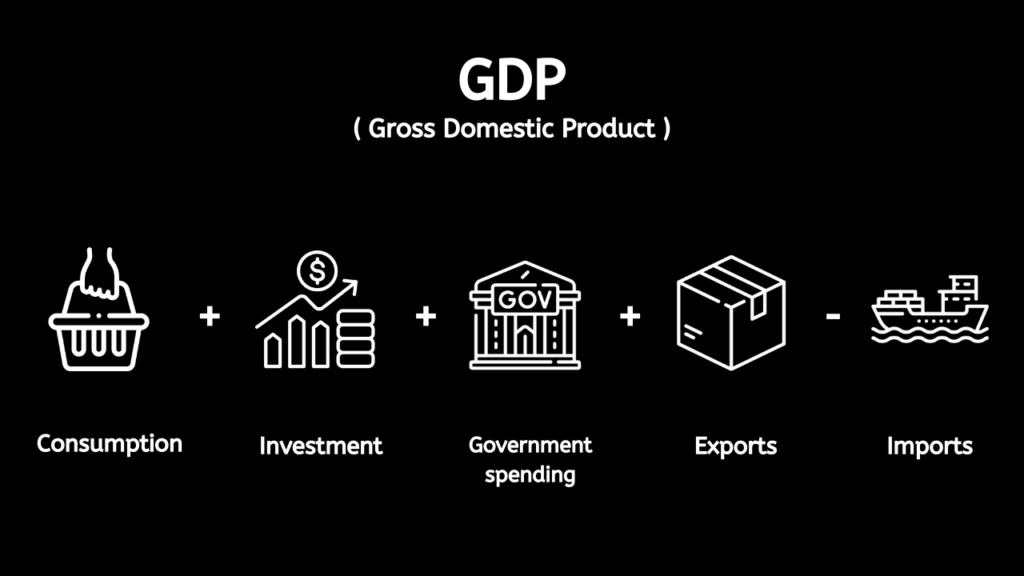The economy – what’s the deal with it? It’s the thing that makes us go to work every day. It influences pretty much every part of our lives. Whether we realize it or not, the economy has a huge impact on our decisions, big and small. That’s why it’s so important for everyone to understand how it works.
Once you get the basics, you’ll be in a much better position to make smarter financial choices in your own life.
In this guide, I’m going to walk you through the key things that control the economy and how they affect us all.

Let’s dive in!
Think of the economy as a giant system where everything is connected.
There are three main parts:

Consumption (What People Buy)
At the heart of the economy is consumption—what people like you and me buy. When we purchase things like food, clothes, or services like healthcare, we create demand. This demand fuels businesses and keeps the economy moving.
Here’s how it works !
- You buy a smartphone or get a haircut. Your spending encourages businesses to keep producing more phones and hire more people to give haircuts. That’s how the cycle continues.
- The more people spend, the more businesses thrive and the economy grows. If fewer people buy stuff, businesses cut back, and that can slow down the economy.
Example: As more people in India buy cars, the car industry grows, creating jobs and boosting the economy.
Production (What Businesses Make)
On the flip side, we have production—what businesses make. This is the supply side of the economy. Whether it’s food, gadgets, or services, what businesses create is crucial to economic growth.
Here’s how it works !
- Businesses make things that people want. They produce goods and services that are sold to us. For example, when a company produces wheat, farmers and workers get paid to plant, harvest, and process it.
- The more businesses produce, the more they can sell, and the more they can hire people. It’s a win-win for the economy when production is high and growing.
Example: India’s tech sector, with companies like Infosys and TCS, is booming. These businesses create software that is sold worldwide, generating income, jobs, and economic growth.
Government (Policy Decisions)
The government plays a major role in the economy. They make decisions about taxes, public spending, and how to handle economic challenges, all of which directly affect our lives.
Here’s how it works !
- The government spends money on things like building roads, schools, hospitals, and providing social services (like subsidies for food and fuel). This spending directly impacts your daily life.
- When the government increases spending, it helps stimulate the economy. But if they borrow too much money, it can lead to higher taxes or even inflation later.
Example: When the government spends on building better roads, it helps businesses move goods more efficiently, which in turn boosts the economy.
The things which I’m going to explain are based on the above 3 building blocks (consumption, Production, Government Policy)
Jobs and Income (Employment & Wages)

Let’s talk about jobs—a crucial piece of the economic puzzle. When people have jobs and earn wages, they can spend money, which helps businesses grow.
Why jobs matter ?
- The number of people employed and their wages directly impact how much money is spent. More jobs and higher wages mean more spending, which keeps the economy strong.
- If there’s high unemployment (when people can’t find jobs), the economy can slow down, and businesses may have to cut back.
Example: When people are earning good wages, they can buy things like cars, smartphones, and go on vacations. This keeps the economy strong.
Salary Matter Too
When wages(salary) go up, people have more money to spend, which helps businesses grow. If wages are stagnant or decrease, people tend to spend less, which can hurt the economy.
Inflation (Price Increases)

What Is Inflation?
You’ve probably heard the term inflation—it’s when the prices of goods and services rise over time. Inflation reduces the value of money, meaning your money doesn’t go as far as it used to.
Here’s why inflation matters !
- When inflation is high, the cost of everyday items like food, gas, and rent increases. So, even though you may be earning the same amount, you may not be able to afford as much.
- The Reserve Bank of India (RBI) and the government work hard to keep inflation in check to prevent prices from rising too quickly.
Example: If the price of vegetables doubles, it can be tough for people, especially those with fixed incomes, to make ends meet.
Interest Rates (Cost of Borrowing Money)

What Are Interest Rates?
Interest rates are what you pay when you borrow money. Banks and financial institutions charge interest as a fee for lending money. These rates are set by the RBI and can affect your finances directly.
Why interest rates matter ?
- When interest rates are low, borrowing is cheaper, which encourages people to buy homes, cars, and other big-ticket items.
- But when rates are high, borrowing gets expensive, which can slow spending and growth.
Example: If interest rates are low, you can afford a larger mortgage, meaning you might be able to buy a bigger house. If rates are high, you might choose to wait or buy something smaller.
Government Spending (Public Services & Infrastructure)

Where Does the Government Spend?
The government’s spending decisions are crucial for the economy. They fund projects like roads, schools, and hospitals—things that benefit the public and help businesses thrive.
What’s the impact ?
- Government spending stimulates the economy by creating jobs and improving infrastructure. But if the government borrows too much money to fund projects, it could lead to problems like inflation or higher taxes in the future.
- Public spending is often directed at improving lives, but it also creates business opportunities and economic growth.
Example: Investment in new highways makes transportation easier, helping businesses move goods faster and opening up new economic opportunities.
Public Debt
Sometimes, the government borrows money to fund big projects. If they borrow too much, it can lead to higher taxes or inflation in the future.
Trade and Foreign Investment (Global Connection)

Imports & Exports
India buys goods (imports) from other countries and sells goods (exports) to the world. Everything from oil to technology affects the economy. When India exports more than it imports, it strengthens the economy.
Foreign Investment
When foreign companies invest in India, they bring new technologies, create jobs, and boost the economy. Rising Foreign Investment (FI) shows that international businesses trust India’s growth and stability. It’s a good sign for the economy!
Example: When India exports software or pharmaceuticals to other countries, it strengthens the economy and creates job opportunities for millions of Indians.
The Role of Banks & Financial Systems

Banks Help Money Flow
Banks are essential to a thriving economy. They help people manage their money, take out loans, and invest. Banks allow you to save, borrow, and invest, which keeps money circulating in the economy. Without banks, economic growth would slow down.
Financial Markets
The stock market and bonds are ways businesses raise money to grow. When you invest in these, you’re helping businesses expand and, in turn, supporting the economy.
Example: When you buy shares in a company, you’re helping that company raise money to expand, which creates jobs and strengthens the economy.
Key Economic Indicators You Should Know

GDP (Gross Domestic Product)
Gross Domestic Product, or GDP, is one of the most important indicators of a country’s economic health. It measures the total value of everything that is produced within the country—whether that’s goods like cars, food, and electronics, or services like healthcare, education, and banking.

This formula calculates the total value of all Goods and Services produced in a country.
When GDP is growing, it means that businesses are producing more, people are spending more, and the overall economy is expanding. In short, the country is doing well, and the standard of living is likely improving.
Unemployment Rate
The unemployment rate measures the percentage of people in the workforce who are actively looking for work but can’t find it. This is a vital indicator because it tells us how well the economy is providing jobs for its citizens.
Why the Unemployment Rate is Important ?
- High Unemployment: A high unemployment rate often signals economic trouble. If many people are out of work, it can mean businesses are struggling, and there may not be enough demand for goods and services. This can also lead to increased poverty and social unrest.
- Low Unemployment: A low unemployment rate is usually a sign of a healthy economy. It means businesses are growing, creating jobs, and people are employed, which increases their spending power and contributes to overall economic growth.
The unemployment rate is not just a statistic—it’s a reflection of how well an economy is functioning in terms of providing opportunities for its people.
Interest Rates
Interest rates are set by a country’s central bank (Reserve Bank of India) and determine how much it costs to borrow money. These rates have a huge influence on everything from home loans to business investment to consumer spending. These affect how much it costs to borrow money.
How Interest Rates Affect the Economy ?
- Lower Interest Rates: When interest rates are low, borrowing money becomes cheaper. This encourages businesses to invest, people to buy homes, and consumers to spend. As a result, lower interest rates tend to stimulate economic growth.
- Higher Interest Rates: On the flip side, when interest rates are high, borrowing money becomes more expensive. This can discourage people and businesses from borrowing, which can slow down spending and economic activity.
Central banks adjust interest rates to control inflation and stimulate or cool down economic activity. Lower rates can fuel economic growth, while higher rates can slow it down.
The Indian Economy’s Big Challenges
India is one of the world’s fastest-growing economies, but it faces significant challenges that can slow down its progress. Let’s explore some of the obstacles.

Income Inequality
There is a huge gap between the rich and the poor in India. While the wealthy have seen their fortunes soar, millions still live in poverty. This inequality isn’t just an issue of fairness—it can also create social unrest and economic instability.
Why It’s a Problem ?
When wealth is concentrated in the hands of a small percentage of the population, it limits access to basic needs like education and healthcare for the majority. This can prevent the country from growing in a balanced way. Reducing inequality by creating more opportunities for those at the bottom can improve stability and lead to higher consumer spending.
Poverty
Even with rapid economic growth, a significant portion of India’s population still struggles to meet basic needs like food, shelter, and healthcare.
Why Poverty Matters ?
Poverty limits people’s purchasing power, making it difficult for them to contribute to the economy. If a large part of the population is struggling, demand for goods and services decreases, which impacts economic growth. Addressing poverty by improving access to education, healthcare, and jobs can help lift more people into the middle class, which will boost the economy.
Corruption & Bureaucracy
Corruption and slow-moving government processes can hold back businesses and prevent effective delivery of public services.
How It Affects the Economy ?
Corruption discourages investment, disrupts markets, and wastes resources. Bureaucratic delays can stall important infrastructure projects and create inefficiencies in public services. Tackling corruption and streamlining government processes can create a more business-friendly environment and improve service delivery to the public.
The Impact of Global Events

In today’s globalized world, events in other countries can have a significant impact on India’s economy. Whether it’s changes in oil prices, a global recession, or geopolitical issues, India’s economy is closely linked to what happens globally.
Global Economy
What happens in other parts of the world directly affects India. For example, fluctuations in oil prices can impact business costs, while a recession in major economies like the U.S. or China can reduce demand for Indian exports. However, economic growth in other countries can also open up new markets for Indian products and services.
Geopolitical Issues
India’s relationships with neighboring countries and global powers play a crucial role in its economic health. Political instability or conflict can disrupt trade, increase costs, and reduce investor confidence. On the other hand, strong diplomatic ties can lead to more trade opportunities, better access to foreign markets, and increased foreign investment.
Technology and Innovation

Technology is rapidly transforming India’s economy, creating new opportunities and driving growth across industries.
Digital Economy
India’s digital economy is booming, thanks to widespread smartphone use and the rise of e-commerce. As more people use digital services, businesses can reach more customers, creating new growth opportunities. Platforms like e-commerce, fintech, and online education are expanding markets and creating new jobs.
Startups & Innovation
India has a thriving startup ecosystem, particularly in technology, finance, and healthcare. These startups are not only creating jobs but also driving innovation and solving problems that can help boost the economy. Many Indian startups have gone global, attracting foreign investment and boosting the country’s reputation as a hub for innovation.
Conclusion
Understanding the economy is key to making smarter financial decisions. From consumption and production to inflation, interest rates, and government policies, each factor shapes how we live and work. By understanding these basics, you’ll be better prepared to handle challenges and take advantage of opportunities.
Exclusive: We’re excited to announce that we’re developing a simple, easy-to-follow course to help you understand a country’s economy like never before! Stay tuned for more details—coming soon!